|
Books Should Be Free Loyal Books Free Public Domain Audiobooks & eBook Downloads |
|
|
Books Should Be Free Loyal Books Free Public Domain Audiobooks & eBook Downloads |
|
Ancient Texts |
|---|
|
Book type:
Sort by:
View by:
|
By: Marcus Minucius Felix | |
|---|---|
 Octavius
Octavius
This ancient Roman dialogue plays out as a religious debate between the Christian lawyer Octavius, and his close friend, a skeptical pagan named Caecilius. Caecilius is relatively agnostic, expressing skepticism towards both aspects of traditional Roman paganism, as well as towards his friend's newfangled Christian religion. Octavius attempts to give the reasons he has for his own beliefs and answer Caecilius' critiques. The author- Marcus Minucius Felix - plays the role of referee and observer. This is one of the earliest Latin texts to talk about Christianity, and describe how the new religion fit in the wider social context of the Roman world... | |
By: Marcus Tullius Cicero | |
|---|---|
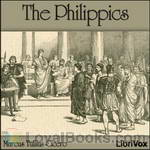 The Philippics
The Philippics
A philippic is a fiery, damning speech delivered to condemn a particular political actor. The term originates with Demosthenes, who delivered an attack on Philip II of Macedon in the 4th century BCE.Cicero consciously modeled his own attacks on Mark Antony, in 44 BC and 43 BC, on Demosthenes’s speeches, and if the correspondence between M. Brutus and Cicero are genuine [ad Brut. ii 3.4, ii 4.2], at least the fifth and seventh speeches were referred to as the Philippics in Cicero’s time. They were also called the Antonian Orations by Aulus Gellius... | |
 On the Ends of Good and Evil
On the Ends of Good and Evil
On the Ends of Good and Evil (Latin: DE FINIBUS BONORUM ET MALORUM) discusses Skeptic, Epicurean, Stoic, Peripatetic and Academic views on the good life. Written by Marcus Tullius Cicero. Translated by Harris Rackham. | |
 On Duties
On Duties
On Duties (Latin: DE OFFICIIS) discusses virtue, expediency and apparent conflicts between the two. St. Ambrose, St. Jerome and other Doctors of the Roman Catholic Church considered it to be legitimate for study. It was the second book after the Bible printed on Gutenberg's press and a standard text taught at Eton College. Written by Marcus Tullius Cicero. Translated by Walter Miller. | |
 Tusculan Disputations
Tusculan Disputations
Tusculan Disputations (Latin: TUSCULANARUM DISPUTATIONUM) is divided into five books which discuss death, pain, grief, perturbations and virtue. At issue is whether wise people can always be happy regardless of the apparent evil that fortune throws in their way. Andrew Peabody says the A. and M. in the text may stand for Auditor, Adolescens, Atticus or Aulus and Marcus or Magister. Written by Marcus Tullius Cicero. Translated by Charles Duke Yonge. | |
By: Marcus Vitruvius Pollio (75 BC - c. 15 BC) | |
|---|---|
 Ten Books on Architecture
Ten Books on Architecture
On Architecture is a treatise on architecture written by the Roman architect Vitruvius and dedicated to his patron, the emperor Caesar Augustus as a guide for building projects. The work is one of the most important sources of modern knowledge of Roman building methods as well as the planning and design of structures, both large (aqueducts, buildings, baths, harbours) and small (machines, measuring devices, instruments). He is also the prime source of the famous story of Archimedes and his bath-time discovery. | |
By: Patanjali | |
|---|---|
 The Yoga Sutras of Patanjali
The Yoga Sutras of Patanjali
Yoga sutras by Patanjali is a seminal work in yoga, this book is more about control of mind and the true goal of yoga. The sutras are extremely brief, and the translation in neat English makes it very easy for people to understand the ancient Sanskrit text. It starts with the birth and growth of spiritual man through the control of mind. In all, this is a "all in one" book for yoga philosophy written by the master himself. | |
 Yoga Sutras of Patanjali (1917 edition)
Yoga Sutras of Patanjali (1917 edition)
The Yoga Sutras of Patanjali are in themselves exceedingly brief, less than ten pages of large type in the original. Yet they contain the essence of practical wisdom, set forth in admirable order and detail. The theme, if the present interpreter be right, is the great regeneration, the birth of the spiritual from the psychical man: the same theme which Paul so wisely and eloquently set forth in writing to his disciples in Corinth, the theme of all mystics in all lands.We think of ourselves as living a purely physical life, in these material bodies of ours... | |
By: Phaedrus (c. 15 BC - c. AD 50) | |
|---|---|
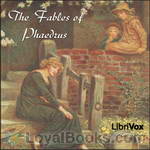 The Fables of Phaedrus
The Fables of Phaedrus
The fable is a small narrative, in prose or verse, which has as its main characteristic the aim of conveying a moral lesson (the “moral”), implicitly or, more normally, explicitly expressed. Even though the modern concept of fable is that it should have animals or inanimated objects as characters – an idea supported by the works of famous fabulists such as Aesop and La Fontaine – Phaedrus, the most important Latin fabulist, is innovative in his writing. Although many of his fables do depict animals or objects assuming speech, he also has many short stories about men, writing narratives that seem to the modern eye more like short tales than fables... | |
By: Plato (427BC - 347BC) | |
|---|---|
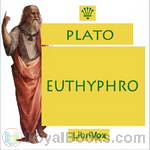 Euthyphro
Euthyphro
Awaiting his trial on charges of impiety and heresy, Socrates encounters Euthyphro, a self-proclaimed authority on matters of piety and the will of the gods. Socrates, desiring instruction in these matters, converses with Euthyphro, but as usual, the man who professes to know nothing fares better than the man who claims to be an expert. One of Plato’s well-known Socratic Dialogues, Euthyphro probes the nature of piety, and notably poses the so-called Euthyphro Dilemma: Do the gods love a thing because it is holy, or is a thing holy because it is loved by the gods? | |
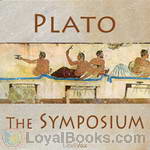 The Symposium
The Symposium
The Symposium (Ancient Greek: Συμπόσιον) is a philosophical book written by Plato sometime after 385 BCE. On one level the book deals with the genealogy, nature and purpose of love, on another level the book deals with the topic of knowledge, specifically how does one know what one knows. The topic of love is taken up in the form of a group of speeches, given by a group of men at a symposium or a wine drinking party at the house of the tragedian Agathon at Athens. Plato constructed the Symposium as a story within a story within a story... | |
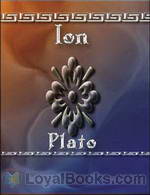 Ion
Ion
In Plato’s Ion, Socrates questions Ion on whether he should really claim laud and glory for his ‘rhapsodic’ recitals of Homer’s poetry. | |
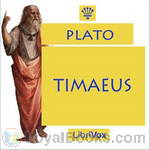 Timaeus
Timaeus
“Our intention is, that Timaeus, who is the most of an astronomer amongst us, and has made the nature of the universe his special study, should speak first, beginning with the generation of the world and going down to the creation of man…” ‘Timaeus’ is usually regarded as one of Plato’s later dialogues, and provides an account of the creation of the universe, with physical, metaphysical and ethical dimensions, which had great influence over philosophers for centuries following. It attributes the order and beauty of the universe to a benevolent demiurge – a ‘craftsman’ or god – fashioning the physical world after the pattern of an ideal, eternal one... | |
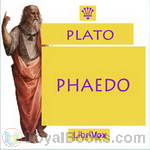 Phaedo
Phaedo
Plato's Phaedo is one of the great dialogues of his middle period, along with the Republic and the Symposium. The Phaedo, which depicts the death of Socrates, is also Plato's seventh and last dialogue to detail the philosopher's final days (the first six being Theaetetus, Euthyphro, Sophist, Statesman, Apology, and Crito).In the dialogue, Socrates discusses the nature of the afterlife on his last day before being executed by drinking hemlock. Socrates has been imprisoned and sentenced to death by an Athenian jury for not believing in the gods of the state and for corrupting the youth of the city... | |
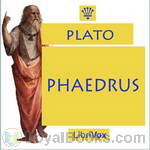 Phaedrus
Phaedrus
“For there is no light of justice or temperance, or any of the higher ideas which are precious to souls, in the earthly copies of them: they are seen through a glass, dimly…”Socrates and his earnest friend Phaedrus, enjoying the Athenian equivalent of a lunchtime stroll in the park, exchange views on love and on the power of words, spoken and written.Phaedrus is the most enchanting of Plato’s Erotic dialogues (capitalised in honour of the god). The barefoot philosopher urges an eager young... | |
 Laws
Laws
Νόμοι (Laws) is Plato's final dialogue written after his attempt to advise the tyrant Dionysius II of Syracuse. The dialogue takes place between: an Athenian Stranger (Socrates? A god in human form?); the quiet Lacedaemonian Megillus; and the Cretan Cleinias. The Stranger asks whether humans live to be more effective at waging war or if there is something more important a legislator should seek to achieve. During their pilgrimage Cleinias discloses his role in the establishment of a new colony... | |
By: Pliny the Elder | |
|---|---|
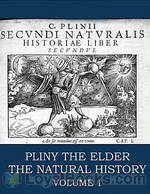 The Natural History
The Natural History
"Naturalis Historia" (Latin for "Natural History") is an encyclopedia published circa AD 77-79 by Pliny the Elder. It is one of the largest single works to have survived from the Roman empire to the modern day and purports to cover the entire field of ancient knowledge, based on the best authorities available to Pliny. The work became a model for all later encyclopedias in terms of the breadth of subject matter examined, the need to reference original authors, and a comprehensive index list of the contents... | |
 The Natural History, volume 2
The Natural History, volume 2
Naturalis Historia (Latin for "Natural History") is an encyclopedia published circa AD 77-79 by Pliny the Elder. It is one of the largest single works to have survived from the Roman empire to the modern day and purports to cover the entire field of ancient knowledge, based on the best authorities available to Pliny. The work became a model for all later encyclopedias in terms of the breadth of subject matter examined, the need to reference original authors, and a comprehensive index list of the contents... | |
By: Plotinus (204-270) | |
|---|---|
 Enneads
Enneads
The six Enneads are the collected writings of the Neoplatonic philosopher Plotinus arranged by his student Porphyry into fifty-four books with each Ennead containing nine. The translator Kenneth Sylvan Guthrie arranged these books chronologically rather than according to Porphyry's numeration. This recording is organized according to Porphyry's numeration with Roman numerals indicating the Ennead and Hindu-Arabic numerals indicating the book e.g. VI.9 would be the ninth book of the sixth Ennead. A hyperlinked table of contents at Volume 1 Page 3 of the gutenberg.org text will enable you to jump to the specific Ennead if you wish to read along with the recording. | |
By: Proclus (412-485) | |
|---|---|
 Elements of Theology
Elements of Theology
The Elements of Theology was written by the Greek Neoplatonist philosopher Proclus and translated by Thomas Taylor who named his youngest son Thomas Proclus Taylor. This book consists of 211 propositions, each followed by a proof, beginning from the existence of the One and ending with the descent of individual souls into the material world. Saint Thomas Aquinas recognized that the Liber de Causis , which had been attributed to Aristotle, was actually a summary of the Elements of Theology, likely written by an Arabic interpreter. - Summary adapted from Wikipedia by Geoffrey Edwards | |
 Six Books of Proclus, the Platonic Successor, on the Theology of Plato
Six Books of Proclus, the Platonic Successor, on the Theology of Plato
The Six books of Proclus, the Platonic successor, on The Theology of Plato to which a Seventh book is added by the translator, Thomas Taylor, in order to supply the deficiency of another book on this subject, which was written by Proclus, but since lost. According to the 1995 Prometheus Trust edition Book 3 Chapter 1 of this translation contains Chapters 1-4 from the original Greek, Chapter 2 contains the Greek chapters 5-6 and Chapter 3 contains the Greek Chapters 7-8. Thereafter, the translated and Greek chapters match beginning at Chapter 9... | |
By: Publius Cornelius Tacitus | |
|---|---|
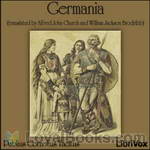 Germania
Germania
The Germania (Latin: De Origine et situ Germanorum, literally The Origin and Situation of the Germans), written by Gaius Cornelius Tacitus around 98, is an ethnographic work on the Germanic tribes outside the Roman Empire. Germania fits squarely within the tradition established by authors from Herodotus to Julius Caesar. Tacitus himself had already written a similar essay on the lands and tribes of Britannia in his Agricola. The Germania begins with a description of the lands, laws, and customs... | |
 A Dialogue Concerning Oratory, or the Causes of Corrupt Eloquence
A Dialogue Concerning Oratory, or the Causes of Corrupt Eloquence
The scene of the Dialogus de Oratoribus, as this work is commonly known, is laid in the sixth year of Vespasian, 75 a.D. The commentators are much divided in their opinions about the real author; his work they all agree is a masterpiece in the kind; written with taste and judgement; entertaining, profound, and elegant. It is normally considered to have been written by Tacitus, even though some ascribe it to Quintilian. The main subject is the decadence of oratory, for which the cause is said to be the decline of the education, both in the family and in the school, of the future orator. In a certain way, it can be considered a miniature art of rhetoric. | |
By: Publius Ovidius Naso | |
|---|---|
 Metamorphoses
Metamorphoses
The Metamorphoses of Ovid is probably one of the best known, certainly one of the most influential works of the Ancient world. It consists of a narrative poem in fifteen books that describes the creation and history of the world through mythological tales, starting with a cosmogony and finishing with the deification of Julius Caesar. Published around 8 AD, the Metamorphoses are a source, sometimes the only source, for many of the most famous ancient myths, such as the stories of Daedalus and Icarus, Arachne or Narcisus... | |
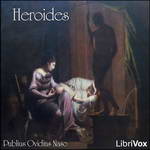 Heroides
Heroides
The Heroides, also known as the Heroines, the Letters of the Heroines or simply as Epistles are a very famous collection of poems by Ovid, not only for their interesting subject – letters by famous mythological characters addressed to their beloved ones – but also because it’s considered by some the first example of the Epistle as a literary genre – a statement made by Ovid himself in his Ars Amatoria. The book as we have it nowadays consists of 21 letters, divided in two parts. The first... | |
By: St. Benedict of Nursia (ca. 480-547) | |
|---|---|
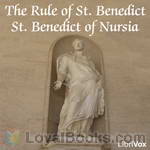 The Rule of St. Benedict
The Rule of St. Benedict
The Rule of Saint Benedict (Regula Benedicti) is a book of precepts written by St. Benedict of Nursia for monks living communally under the authority of an abbot. Since about the 7th century it has also been adopted by communities of women. During the 1500 years of its existence, it has become the leading guide in Western Christianity for monastic living in community. The spirit of St Benedict's Rule is summed up in the motto of the Benedictine Confederation: pax ("peace") and the traditional ora et labora ("pray and work").(Introduction from Wikipedia) | |
By: The Venerable Bede (673-735) | |
|---|---|
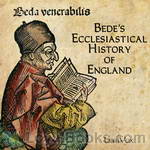 Ecclesiastical History of England
Ecclesiastical History of England
Bede's Ecclesiastical History of England is a work in Latin by Bede on the history of the Christian Churches in England, and of England generally; its main focus is on the conflict between Roman and Celtic Christianity. It is considered to be one of the most important original references on Anglo-Saxon history. It is believed to have been completed in 731, when Bede was approximately 59 years old. Divided into five books, it covers the history of England, ecclesiastical and political, from the time of Julius Caesar to the date of its completion (731)... | |
By: Theophrastus | |
|---|---|
 Characters Of Theophrastus
Characters Of Theophrastus
Theophrastus was an ancient Greek philosopher, successor to Aristotle in the Peripatetic School. He wrote on many topics: biology, geology, physics, metaphysics, psychology, ethics, logic – and more. His book Characters… contains thirty brief, vigorous, and trenchant outlines of moral types, which form a most valuable picture of the life of his time, and in fact of human nature in general. They are the first recorded attempt at systematic character writing. “Apart from slight variations of local coloring and institutions, the descriptions of the old Greek philosopher might apply almost as well to the present inhabitants of London or Boston as to the Athenians of 300 B... | |
By: Thomas Whittaker (1856-1935) | |
|---|---|
 The Origins of Christianity
The Origins of Christianity
The full title of this book is The Origins of Christianity with an Outline of Van Manen’s Analysis of The Pauline Literature. Willem Christiaan van Manen (1842-1905) was a Dutch theologian. The vast majority of van Manen’s radical criticism of the New Testament and Christian origins has never been translated into English.In this book, Thomas Whittaker outlines the arguments of van Manen for an English-speaking audience. Van Manen’s work is not now generally known, but his views obtained notoriety by the articles and books that he wrote, in which he maintained that none of the Epistles that bear the Apostle Paul’s name were in fact written by him... | |
By: Titus Livius (c55BC - c17AD) | |
|---|---|
 From the Foundation of the City
From the Foundation of the City
Ab urbe condita, is a monumental history of ancient Rome written in the Latin language by Titus Livius(Livy), an ancient Roman historian. The work covers the time from the stories of Aeneas, the earliest legendary period from before the city's founding in c. 753 BC, to Livy's own times in the reign of the emperor, Augustus. The last year covered by Livy is 745 AUC, or 9 BC, the death of Drusus. About 25% of the work survives.Livy's History of Rome was in demand from the publication of the first packet... | |
By: Titus Lucretius Carus (94? BC - 49? BC) | |
|---|---|
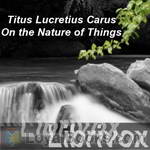 On the Nature of Things
On the Nature of Things
Written in the first century b.C., On the Nature of Things (in Latin, "De Rerum Natura") is a poem in six books that aims at explaining the Epicurean philosophy to the Roman audience. Among digressions about the importance of philosophy in men's life and praises of Epicurus, Lucretius created a solid treatise on the atomic theory, the falseness of religion and many kinds of natural phenomena. With no harm to his philosophical scope, the author composed a didactic poem of epic flavor, of which the imagery and style are highly praised. | |
 On the Nature of Things (Munro translation)
On the Nature of Things (Munro translation)
Titus Lucretius Carus , the author of "De Rerum Natura" or "On the Nature of Things," was a Roman poet and philosopher. The work, a didactic poem expounding the teachings of Epicurus, often rises to sublime and lyrical heights. Lucretius enjoins us to shun superstitious fears and religious rituals. The universe is governed by the laws of matter and energy. The world, like ourselves, is mortal. But the philosophic materialism of Lucretius does not impair his awestruck delight in the spectacle of the heavens, in the play of dust motes in a beam of light, in the sight of molten metals, or of the fierce breed of lions, or of horses surging from a starting gate... | |